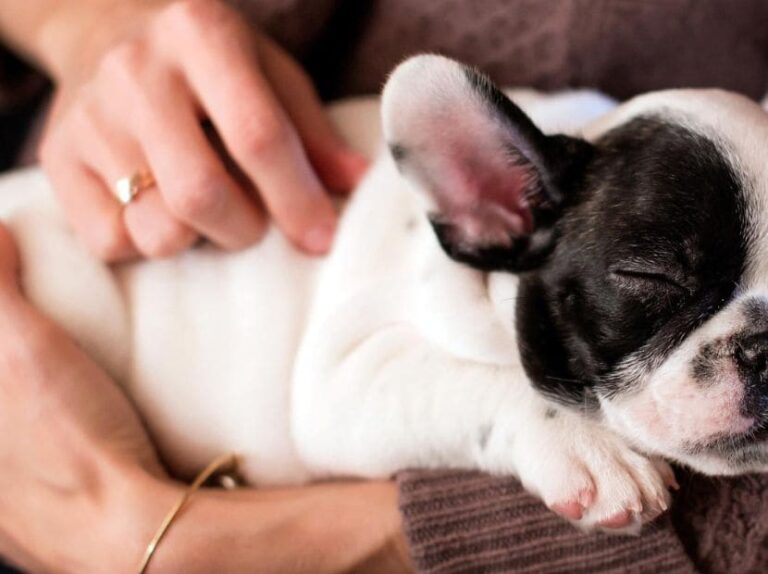Understanding the Breed

Before you start breeding French Bulldogs, it’s crucial to understand the breed itself. French Bulldogs are a popular breed known for their affectionate nature, compact size, and unique appearance. However, they also come with specific health concerns that any breeder must know. These include respiratory issues due to their short snouts and potential joint and hip problems.
There are also different French Bulldog breeds, each with slight variations in appearance and temperament. Understanding these differences is essential, especially if you’re considering French Bulldog hybrid breeds. Hybrid breeds are often sought after for their unique looks and potential for reduced health issues, but they also require careful consideration and understanding of both parent breeds.
Next, we’ll dive into the preparation required for breeding French Bulldogs, including selecting suitable dogs and understanding the cost of breeding French Bulldogs.
Preparing for Breeding
Preparation is vital when it comes to breeding French Bulldogs. The first step is research and education. Breeding French Bulldogs is not something to be taken lightly. It requires a deep understanding of the French Bulldog breeding process, including its challenges and responsibilities.
Selecting suitable dogs for breeding is crucial. You should ensure that both the male and female dogs are healthy, free from genetic disorders, and have sound temperaments. Health testing is essential to this process, particularly for conditions like hip dysplasia, respiratory issues, and other common health problems in the breed. When choosing dogs, consider their pedigree and bloodline. Dogs with solid bloodlines are likelier to produce healthy puppies with desirable traits.
Understanding the cost of breeding French Bulldogs is another crucial aspect. Breeding French Bulldogs can be expensive, including health tests, veterinary care, food, and registration fees. Budgeting for these expenses before you start the breeding process is essential.
Now that you’re prepared let’s explore the actual French Bulldog breeding process, including the timing of mating and the methods used.
The Breeding Process
The French Bulldog breeding process starts with timing the mating. Female French Bulldogs have heat cycles, which usually occur twice a year. The optimal time for mating is during the estrus stage, which occurs about 9 to 14 days into the heat cycle. Signs that the female is ready to breed include increased urination, a swollen vulva, and a willingness to accept the male.
There are different methods for breeding, including natural mating and French Bulldog breeding artificial insemination. Natural mating is the most straightforward method, but it’s only sometimes possible, especially with French Bulldogs. Due to their physical structure, many French Bulldogs cannot mate naturally and may require artificial insemination. This method involves collecting sperm from the male and inserting it directly into the female’s uterus.
After mating, it’s essential to monitor the health of the female dog. Watch for signs of pregnancy, such as a change in appetite, weight gain, and a more affectionate demeanor. Now that the breeding process is complete, the next step is caring for the pregnant dog, which we’ll discuss in the following section.
Caring for the Pregnant Dog
A Frenchie pregnancy typically lasts about 63 days from conception. However, monitoring the dog’s health closely is essential, as some French Bulldogs may deliver a few days earlier or later, making each Frenchie pregnancy unique.
Caring for a pregnant French Bulldog requires attention to her diet, health, and overall well-being. During pregnancy, a French Bulldog’s nutritional needs will change. It’s essential to provide a balanced diet rich in protein, vitamins, and minerals to support her health and the development of the puppies. High-quality dog food specifically designed for pregnant and nursing dogs is ideal.
Regular veterinary care is also essential during pregnancy. Your vet will monitor the health of the mother and the developing puppies, perform ultrasounds to confirm the pregnancy, and provide guidance on caring for the mother. Preparing for the birth is another crucial step. Set up a comfortable and safe whelping area where the mother can give birth. The location should be quiet, clean, and free from drafts.
As the pregnancy progresses, you must watch for signs that labor is approaching. These signs include restlessness, nesting behavior, and a drop in body temperature. With the mother prepared for birth, let’s explore the birthing process in detail.
The Birthing Process (Whelping)
The birthing process, also known as whelping, can be both exciting and stressful. It’s essential to be prepared and know what to expect. Whelping typically occurs in three stages: labor, delivery of the puppies, and delivery of the placenta. The first stage of labor involves the mother becoming restless and panting. This phase may extend for 6 to 12 hours.
During the second stage, the puppies are born. Typically, each youngster is born between thirty and sixty minutes after the one before it. If more than two hours pass between puppies or the mother is straining without producing a puppy, you should contact your vet immediately. French Bulldogs often require assistance during delivery due to their physical structure. In some cases, a C-section may be necessary.
Once all the puppies are born, the third stage involves the delivery of the placenta. It is important that the mother delivers each puppy’s placenta, as retained placentas can cause serious health issues.
After the birth, your top priorities are caring for the newborn puppies and monitoring the mother’s health. Next, we’ll discuss how to care for the puppies and help them grow into healthy dogs.
Raising the Puppies

Raising and caring for French Bulldog puppies requires careful attention to their nutrition, health, and socialization. The puppies will rely entirely on their mother’s milk for the first few weeks. If the mother cannot nurse, you may need to bottle-feed the puppies with a unique formula for newborn dogs.
As the puppies grow, you can gradually introduce solid food. Start with high-quality puppy food that is easy to digest. As the puppies reach 4 to 6 weeks old, they will begin to wean off their mother’s milk and eat more solid food. Regular health checks and vaccinations are also essential during this time. Your vet will guide you on the vaccination schedule and perform routine health checks to ensure the puppies are developing correctly.
Socialization is another crucial aspect of raising French Bulldog puppies. Early socialization helps the puppies grow into well-adjusted adult dogs. Introduce them to various people, places, and animals in a positive and regulated way.
Once the puppies are old enough, it’s time to find them new homes. In the next section, we’ll discuss how to screen potential owners and ensure your puppies go to loving, responsible homes.
Finding Homes for the Puppies
Finding the right homes for your French Bulldog puppies is crucial. Screen potential owners to ensure they are prepared for owning a French Bulldog. Ask questions about their lifestyle, experience with dogs, and why they want a French Bulldog.
It’s also important to have contracts and agreements in place. These contracts should outline the new owner’s responsibilities and include health guarantees or return policies. Providing ongoing support to new puppy owners is another crucial step. Offer advice on caring for their new puppy, and be available to answer any questions.
When finding homes for your puppies, consider the best breeder for French Bulldog standards. These standards ensure that your puppies go to responsible and loving homes. Additionally, being a responsible breeder involves educating new owners about the breed and the responsibilities of owning a French Bulldog.
Next, we’ll summarise the blog post with a conclusion and frequently asked questions about breeding French Bulldogs.
Conclusion
Breeding French Bulldogs is a complex and rewarding process that requires careful planning, dedication, and a deep understanding of the breed. From selecting suitable dogs and understanding the cost of breeding French Bulldogs to caring for the pregnant dog and raising healthy puppies, each step is crucial to ensuring the well-being of both the mother and her puppies.
Becoming a French Bulldog breeder is not just about producing puppies; it’s about being responsible, ethical, and dedicated to the health and happiness of the breed. Whether you’re interested in fluffy French Bulldog breeders or more traditional types, the principles of responsible breeding remain the same.
Banning French Bulldog breeding is a topic of concern in some regions due to the potential health issues associated with the breed. As a breeder, it’s your responsibility to prioritize the health and well-being of your dogs and work towards improving the breed’s overall health.
FAQs
How long does it take for a French Bulldog to give birth?
The birthing process, or whelping, can vary, but it typically takes 6 to 12 hours from the onset of labor to the delivery of all puppies. During the first stage of labor, the mother may seem restless and start nesting. This can last several hours as the cervix dilates. The second stage involves active contractions and the delivery of each puppy. Each puppy should be born within 30 minutes to an hour of the previous one. Contacting a vet is essential if there are any significant delays or the mother seems struggling.
What are the common health issues in French Bulldog breeding?
French Bulldogs are prone to several health issues that everyone, especially potential breeders, must know. These include Brachycephalic Airway Syndrome (BAS) due to their short snouts, which can cause breathing difficulties. Hip dysplasia is another concern, affecting the dog’s joints and leading to pain or arthritis. Skin allergies are also common, requiring careful management of diet and environment. Additionally, French Bulldogs may suffer from Intervertebral Disc Disease (IVDD), a condition affecting their spine. Regular health screenings and choosing healthy breeding pairs are crucial to minimize these risks.
How many puppies can a French Bulldog have?
French Bulldogs typically have small litters, with an average of 3 to 5 puppies. However, it’s not uncommon for a French Bulldog to have as few as one or as many as seven puppies. Due to their small size and the potential complications during birth, it’s essential to monitor the mother closely and be prepared for any issues. Smaller litters often mean the puppies are more significant, which can increase the likelihood of needing a C-section.
How much does French Bulldog breeding cost?
The cost of breeding French Bulldogs can range from $5,000 to $8,000 per litter. This includes health tests, veterinary care, artificial insemination, and the cost of a C-section if needed.
Are French Bulldogs challenging to breed?
Yes, breeding French Bulldogs can be challenging due to their unique physical characteristics and health concerns. Their narrow hips make natural breeding difficult, often requiring artificial insemination. Additionally, their short snouts can lead to breathing issues, complicating pregnancy and labor. French Bulldogs also have a high likelihood of needing a C-section due to the puppies’ large heads and the mother’s small pelvis. Breeding French Bulldogs requires careful planning, knowledge, and veterinary support.
Do all Frenchies need a C-section?
While not all French Bulldogs require a C-section, many do. Due to their large heads and the mother’s narrow pelvis, natural birth can be risky and challenging. C-sections are often recommended to ensure the safety of both the mother and the puppies. Breeders should work closely with a veterinarian to determine the best action based on the dog’s health and circumstances. In some cases, natural birth may be possible, but the decision should be made with caution.




